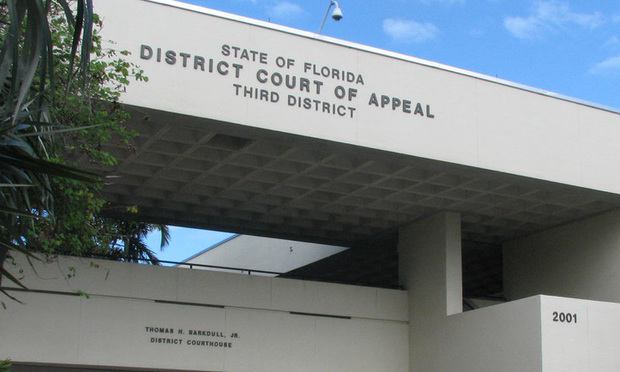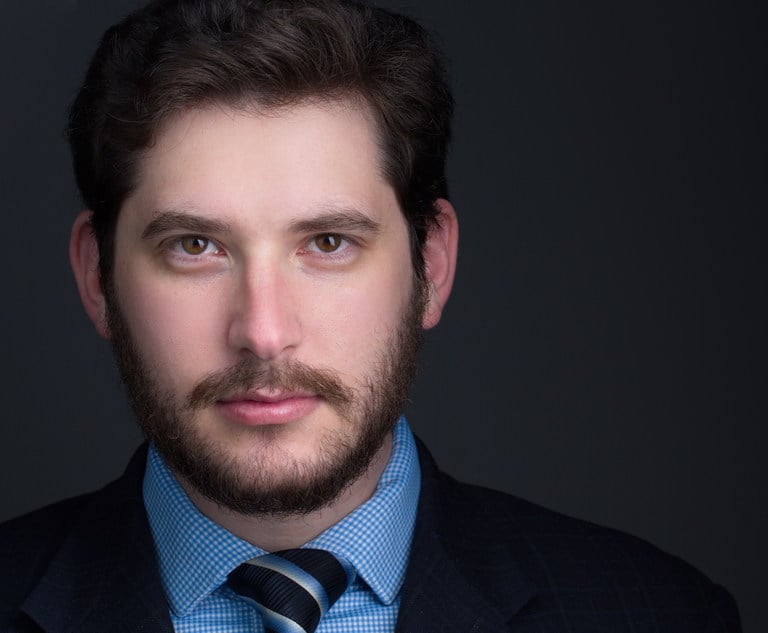Is Gov. Scott Trying to Quickly Appoint Conservative South Florida Judges Before Leaving Office?
Attorneys are divided on whether political considerations are at play as the Third District Court of Appeal Judicial Nominating Commission prepares to send its list of nominees to Gov. Scott to fill the vacancies left by the resignations of Chief Judge Leslie Rothenberg and Judge Richard Suarez.
October 24, 2018 at 04:17 PM
6 minute read
 Third District Court of Appeal at 2001 SW 117th Ave. in Miami. Photo: J. Albert Diaz/ALM
Third District Court of Appeal at 2001 SW 117th Ave. in Miami. Photo: J. Albert Diaz/ALM
Following two days' worth of interviews, the Third District Court of Appeal Judicial Nominating Commission is poised to announce the names it's submitting to Gov. Rick Scott to fill vacancies on the appellate court at any moment.
However, amid a heated election cycle and a renewed focus on how Florida judges reach the bench, some are speaking out about the mechanism for judicial nominations and appointments.
 Judge Leslie B. Rothenberg.
Judge Leslie B. Rothenberg.The public was notified Sept. 26 that Chief Judge Leslie Rothenberg and Judge Richard Suarez would be resigning from their posts prior to the end of their terms in 2019. Consequently, the Third District Court of Appeal Judicial Nominating Commission announced it would be convening to review submissions and applications to fill the newly created vacancies.
With an application deadline of Oct. 15, aspiring appellate judges only had 19 days to assemble their resumes and prepare for interviews taking place only one week later.
According to Miami attorneys Marcos D. Jimenez and Lilly Ann Sanchez, this expedited process is nothing unusual. In addition to sitting on the Third District Court of Appeal Judicial Nominating Commission, both attorneys have also chaired the commission within the last decade.
 Judge Richard J. Suarez.
Judge Richard J. Suarez.“When I was on the JNC we did it really quickly. It was usually pass the names to the governor's office right after the interviews,” Jimenez told the Daily Business Review. “It might not be incredibly right after, but really close.”
“The fact that the names are coming out today from interviews over the past two days is status quo,” Sanchez said. “That is how we do it because the interviews are the last piece of the puzzle and the process.”
Sanchez noted that the quick turnaround time between interviews and nominations was for the sake of keeping conversations with prospective candidates “very fresh in the minds of the commissioners.”
“What I will tell you is unusual about these two positions is that there is generally a longer period of time from the time the applications are submitted to the time the interviews are conducted, especially for appellate positions,” she added. “What was a little abbreviated here was the time frame to give the public notice for those that applied and giving the commissioner to get in touch with references and thoroughly vet all of the applicants.”
However, others perceive Rothenberg and Suarez's resignations, as well as the ensuing nomination process, as part of a larger debate over the ability of the Florida governor to have an outsized say in judicial appointments.
Jimenez noted that “it's really the governor's office that takes the time to interview the candidates and select the person or persons for the position.”
'It's Suspect'
The governor's ability to shape the bench has been highlighted by outgoing Scott's conflict with the Florida Supreme Court over his ability to select the Judicial Nominating Commission's nominations to replace three outgoing state supreme court justices.
Philip Padovano, a former circuit and appellate judge who served on the First District Court of Appeal, told the Daily Business Review that these vacancies might be part of a larger trend to keep Florida courts conservative. Padovano noted that Rothenberg and Suarez's resignations caught his eye since they will be resigning shortly before their terms ended.
“It's suspect to say the least,” Padovano, who is now a private practitioner, said. “I don't want to say that it's widespread, but every year there are a handful of judges who want to rig the system to make sure that their successor is appointed either because they prefer the appointment system to the election system, or they want to make sure the incumbent governor gets to pick. I don't think that's a decision that should be in the hands of outgoing judges.”
Padovano said he has litigated several cases where trial judges have resigned shortly before the end of their terms, thereby circumventing merit retention and qualifying periods. He refers to this as “a manipulation that's designed to convert an election into an appointment.”
Padovano also asserted this trend has correlated with an increased politicization of the Judicial Nomination Commission, who provides the list of judges from which the governor selects appointments. The Florida Supreme Court has ruled that barring a tainted selection process, the governor must pick from the commission's nominations.
“When it started it was perfectly neutral and perfectly fair,” Padovano said of the JNC's origins in the 1970s. He noted the JNC's original composition — three people chosen by the Florida Bar, three people picked by the governor and a subsequent three selected by the commission itself — changed under the tenure of former Gov. Jeb Bush.
“The Legislature changed it,” according to Padovano. “Now the governor gets six picks, the Florida Bar gets three picks that they recommend to the governor, but the governor can refuse any of those picks as many times as he wants.”
“So the governor gets to pick all nine people on the nominating commission,” Padovano added. “And the history has shown that Gov. Scott has rejected more than 100 names.”
Padovano said he believes “we should change the way the nominating commissions are constituted,” or alternatively, “give up this charade, and let the governor pick who we wants.”
Even in light of the criticism by Padovano and others, many maintain their full faith in the system for state judicial appointments as they stand.
“I'm proud of my time and service on the JNC, and having been on the JNC I know how seriously the commissioners take their position,” Sanchez said. “And I'm fully confident — always — that all applicants are properly vetted and we have very good judges on the bench.”
Related stories:
Fight Over Judicial Vacancy Ratchets Up After Court Steps In
5 Judges Vying to Replace Miami-Dade Circuit Judge Sarah Zabel
11th Circuit Judge Carnes to Take Senior Status
Florida Governor Wants Supreme Court Justice Off Crucial Case
South Florida Adds More Black Judges After Push From Bar Groups
This content has been archived. It is available through our partners, LexisNexis® and Bloomberg Law.
To view this content, please continue to their sites.
Not a Lexis Subscriber?
Subscribe Now
Not a Bloomberg Law Subscriber?
Subscribe Now
NOT FOR REPRINT
© 2025 ALM Global, LLC, All Rights Reserved. Request academic re-use from www.copyright.com. All other uses, submit a request to [email protected]. For more information visit Asset & Logo Licensing.
You Might Like
View All
Tragedy on I-95: Florida Lawsuit Against Horizon Freight System Could Set New Precedent in Crash Cases
2 minute read
'You Lied to the Jury': Veteran Awarded $5 Million in Defamation Case Against CNN
4 minute read
Vedder Price Shareholder Javier Lopez Appointed to Miami Planning, Zoning & Appeals Board
2 minute readTrending Stories
Who Got The Work
J. Brugh Lower of Gibbons has entered an appearance for industrial equipment supplier Devco Corporation in a pending trademark infringement lawsuit. The suit, accusing the defendant of selling knock-off Graco products, was filed Dec. 18 in New Jersey District Court by Rivkin Radler on behalf of Graco Inc. and Graco Minnesota. The case, assigned to U.S. District Judge Zahid N. Quraishi, is 3:24-cv-11294, Graco Inc. et al v. Devco Corporation.
Who Got The Work
Rebecca Maller-Stein and Kent A. Yalowitz of Arnold & Porter Kaye Scholer have entered their appearances for Hanaco Venture Capital and its executives, Lior Prosor and David Frankel, in a pending securities lawsuit. The action, filed on Dec. 24 in New York Southern District Court by Zell, Aron & Co. on behalf of Goldeneye Advisors, accuses the defendants of negligently and fraudulently managing the plaintiff's $1 million investment. The case, assigned to U.S. District Judge Vernon S. Broderick, is 1:24-cv-09918, Goldeneye Advisors, LLC v. Hanaco Venture Capital, Ltd. et al.
Who Got The Work
Attorneys from A&O Shearman has stepped in as defense counsel for Toronto-Dominion Bank and other defendants in a pending securities class action. The suit, filed Dec. 11 in New York Southern District Court by Bleichmar Fonti & Auld, accuses the defendants of concealing the bank's 'pervasive' deficiencies in regards to its compliance with the Bank Secrecy Act and the quality of its anti-money laundering controls. The case, assigned to U.S. District Judge Arun Subramanian, is 1:24-cv-09445, Gonzalez v. The Toronto-Dominion Bank et al.
Who Got The Work
Crown Castle International, a Pennsylvania company providing shared communications infrastructure, has turned to Luke D. Wolf of Gordon Rees Scully Mansukhani to fend off a pending breach-of-contract lawsuit. The court action, filed Nov. 25 in Michigan Eastern District Court by Hooper Hathaway PC on behalf of The Town Residences LLC, accuses Crown Castle of failing to transfer approximately $30,000 in utility payments from T-Mobile in breach of a roof-top lease and assignment agreement. The case, assigned to U.S. District Judge Susan K. Declercq, is 2:24-cv-13131, The Town Residences LLC v. T-Mobile US, Inc. et al.
Who Got The Work
Wilfred P. Coronato and Daniel M. Schwartz of McCarter & English have stepped in as defense counsel to Electrolux Home Products Inc. in a pending product liability lawsuit. The court action, filed Nov. 26 in New York Eastern District Court by Poulos Lopiccolo PC and Nagel Rice LLP on behalf of David Stern, alleges that the defendant's refrigerators’ drawers and shelving repeatedly break and fall apart within months after purchase. The case, assigned to U.S. District Judge Joan M. Azrack, is 2:24-cv-08204, Stern v. Electrolux Home Products, Inc.
Featured Firms
Law Offices of Gary Martin Hays & Associates, P.C.
(470) 294-1674
Law Offices of Mark E. Salomone
(857) 444-6468
Smith & Hassler
(713) 739-1250







